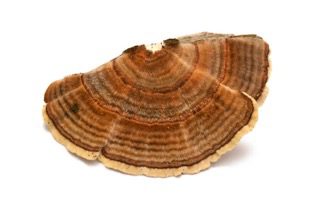

The Turkey Tail Mushroom, also known as Trametes Versicolor or Coriolus Versicolor, is a type of fungus that is safe for dogs to consume in moderation. It is a natural and nutritious food option for dogs and is packed with antioxidants, prebiotics, and immune-boosting properties. It is mainly found on dead trees and logs and is used for medicinal purposes around the world.
Turkey tail mushroom is a type of fungus that grows on dead trees and logs. It contains beta-glucans, a special polysaccharide type that has immune-boosting, anti-cancer, and anti-tumor properties. Additionally, turkey tail contains prebiotics that nourish the good bacteria in the gut, enhancing digestive health. It is also packed with antioxidants, such as flavonoids and phenols, that help reduce inflammation in the body, preventing arthritis and other inflammatory diseases in dogs.
Raw turkey tail is tough and woody, making it difficult for dogs to chew on. It also contains chitin, which is hard for dogs to digest. Consumption of raw turkey tail mushrooms can lead to intestinal gas and liver irritation in dogs. Excessive consumption can also cause toxicity.
Before serving turkey tail to dogs, it must be cleaned and cooked until tender by boiling or steaming. It can be mixed with dog food or consumed directly in moderation. Turkey tail mushroom supplements formulated for dogs are available in capsule, oil extract, and powder form. It is important to follow dosing instructions to prevent mushroom overdose. The standard recommended daily dosage of turkey tail mushroom powder for dogs is ½ teaspoon per 25 lbs.
Turkey Tail Mushroom for Dogs: Benefits and Risks
Turkey tail mushroom is a safe food option for dogs when consumed in moderation. It is rich in nutrients with antioxidant, antifungal, and anti-inflammatory properties. However, it must be cooked before feeding to dogs.
Benefits: Turkey Tail Mushroom has beta-glucans that help boost the immune system, anti-tumor and anti-cancer properties, prebiotics that enhance digestive health, and antioxidants that help reduce inflammation, prevent arthritis, and other inflammatory diseases in dogs.
Risks: Raw mushrooms are not recommended for dogs, as they are challenging to digest and can cause gastrointestinal problems such as gas and liver irritation if consumed in excess. It is crucial to cook turkey tail mushrooms before serving them to your furry friend.
Servings: After cleaning, the turkey tail mushrooms should be cooked until tender by boiling or steaming before adding them as a treat or supplement. It can be served mixed in with your dog's regular food or consumed on its own. The recommended daily dosage is ½ teaspoon per 25 lbs, and it is essential to follow dosing instructions to prevent an overdose.
Alternatives: If turkey tail mushrooms are not available, you can substitute them with Shiitake mushrooms, which have beta-glucans, prebiotics, and antioxidant properties similar to turkey tail mushrooms. Another alternative is Reishi mushrooms, which have immune-boosting and anti-inflammatory properties.
Have you tried giving your dog turkey tail mushrooms? Share your experience with us! Remember to always consult your veterinarian before introducing any new foods or supplements to your dog's diet. Give your furry friend a wag from us!